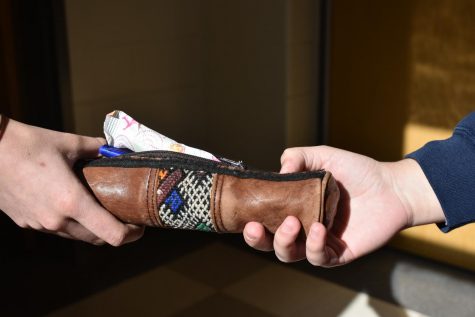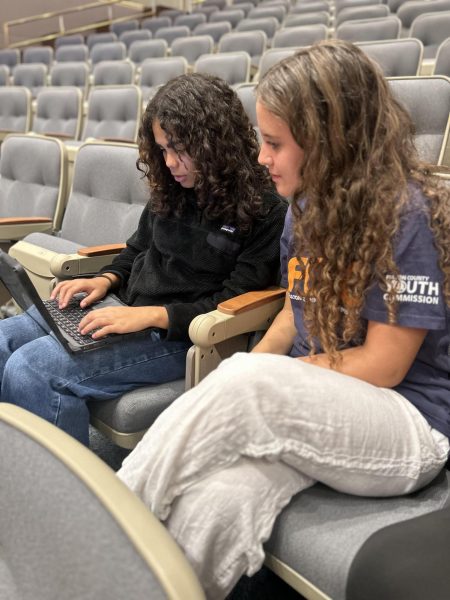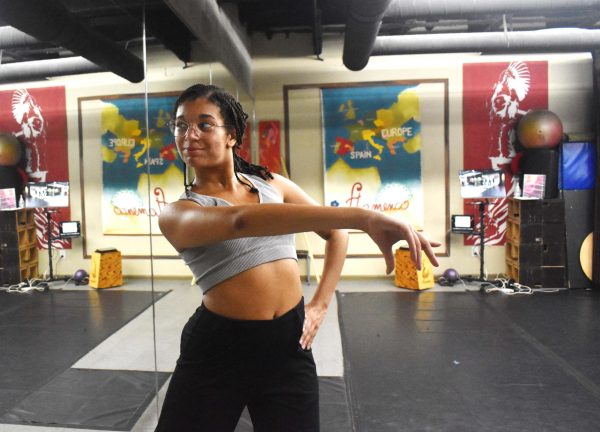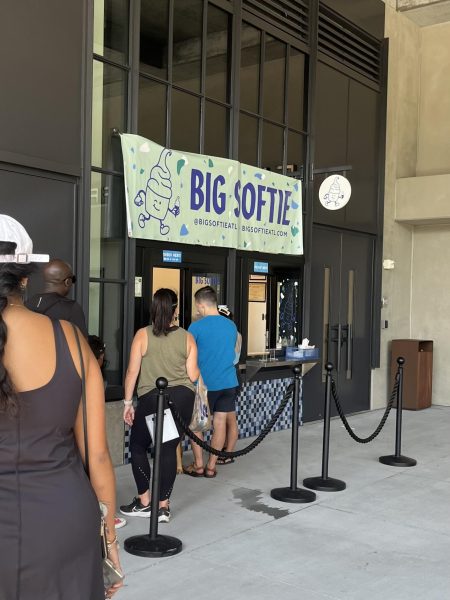Feminine products kept hidden

pouches or purses, mindful of the pressure to hide their periods from their classmates.
The text comes 15 minutes before the end of first period. Senior Nina Hannaford has to meet a friend next to some lockers on the E100 hall to deliver the product. When Hannaford gets there, her friend gives her pencil pouch and keeps watch as Hannaford transfers a small plastic bag from the bottom of her backpack.
Everyday at Grady, girls perform these drug deal-like transactions for tampons to ensure that the rest of the school doesn’t notice they’re menstruating.
“It’s awkward to just carry a tampon in your hand in school,” Hannaford said. “I don’t want everyone knowing I’m on my period.”
From a young age, girls are taught to hide when they are on their periods: “Don’t talk about it in front of people, especially not boys, and make sure no one ever see your pads or tampons.” “Become an expert at carrying your tampons up your sleeves.”
Even the language used to discuss menstruation, like “time of the month” and “code red,” hides a process that affects half the population, monthly. A study by Clue, a women’s health company which has developed an app to help women track their periods, and the International Women’s Health Coalition, report more than 5,000 slang terms and euphemisms for the menstruation cycle worldwide.
So why do girls go to such lengths to disguise their periods?
“Boys seem really uncomfortable hearing about periods,” Hannaford said. “It’s not that I feel uncomfortable. It’s that guys think it’s gross and don’t understand what’s happening. All they know is girls are bleeding.”
Sophomore Owen Mork thinks boys are averse to hearing about periods because they don’t have them.
“It’s not uncomfortable for me to hear about periods,” Mork said. “It’s something that happens to all girls. I do feel like other boys put a lot of emphasis on how gross it is because it’s something they don’t experience on a monthly basis.”
Though students may become more mature and knowledgeable about menstruation as they enter high school, girls already internalize the stigmas surrounding periods when most of them began menstruating in middle school.
“When I was younger and first started my period, [the stigma around discussing periods] made handling my period harder since I didn’t know what I was doing,” Hannaford said. “Now it has just become a thing I deal with.”
Dealing with a period can encompass more than learning to go to the bathroom with a tampon up your sleeve or a pad hidden in a purse. Women often have to hide extreme cramping, fatigue, headaches and other symptoms and still be expected to function at their regular level of performance.
“I definitely think there are issues that arise when people don’t feel comfortable talking about periods,” health teacher Tamara Aldridge said. “I’ve had students miss classes because they were trying to find [a tampon] or were in the restroom because they started their periods and messed their clothes up. Sometimes, students miss school because of side effect of periods like cramping.”
Staying quiet about periods can do more than rack up a girl’s absence record; it can prevent her from getting the medical attention she needs if she has a more serious problem.
“A bigger picture concern is if there are any medical needs that need to be addressed with a doctor, a woman may not feel comfortable talking about it because periods have been so taboo to discuss,” Aldridge said.
Discomfort when discussing periods around boys isn’t the only thing teaching girls to be quiet. Advertising and media tell girls to be discreet.
Tampax, the most popular tampon brand in the U.S. from 2011 to 2016, according to Statista, markets its products as objects to be hidden. For instance, the Tampax Radiant product is advertised for its “discreet and resealable wrapper.”
“Menstrual etiquette requires that women hide the fact of their periods … especially from men,” University of Illinois researcher Rebecca Ginsburg said in her study Don’t Tell, Dear: The Material Culture of Tampons and Napkins.
Ginsberg examined more than 150 boxes of feminine sanitary products and concluded that “the design of the objects and of their packaging can be read as encouraging private, discreet consumption.”
Mainstream teen-oriented media like Buzzfeed also perpetuate the idea that menstruation is something to be ashamed about.
When a Southerner reporter researched “period stories” on Buzzfeed, “15 Period Horror Stories” and “17 Outrageously Embarrassing Period Confessions” are within the first five headlines that came up. Stories favoring a positive perspective on dealing with periods are far outnumbered by anonymous confessions of shameful moments on the site.
Whether a girl carries her tampon in her palm or in her sleeve may seem trivial, Ginsburg argues it points to an ignorance of women’s health issues.
One group most affected by a lack of discussion surrounding menstruation is homeless women. The women’s magazine Jezebel estimates that the average woman spends around $120 on menstrual pads and tampons a year, a figure that doesn’t include the additional costs for expensive products like birth control that many women often use to pass over their periods.
Some cities have made progress to alleviate cost issue for homeless women. In 2016, New York City passed an ordinance requiring public schools, prisons and homeless shelters to give all women access to feminine hygiene products free of charge. Atlanta has yet to enact such a measure.
Though awkwardness may always arise around the topic of periods, a study by the Columbia University’s Mailman School of Public Health investigating menstrual hygiene said that getting past that stigma can encourage constructive discussion about periods. If girls are comfortable discussing their periods, perhaps they will be more confident in accepting the process and getting the help they need if medical issues arise.
“You shouldn’t have to miss out on life because you have a uterus,” Aldridge said.
Anya is a senior at Grady High School. She's excited to edit the news section this year and learn more about the Grady/Atlanta community through writing!










![DAINTY DESIGN: When junior and designer Anastasia Varenberg (left) approached junior Ella Thornbury (right) for modeling, Thornbury knew she had to accept.
“She's my best friend in the whole world, so obviously, I had to say yes,” Thornbury said.
In return, Varenberg created an intricate dress fitted specifically for Thornbury.
“I was trying to go architectural with a lot of these like leaves,” Varenberg said. “I also made a cool little thing where [the dress] folds over. It looks kind of flowery and dainty and reminds me of Vivian Westwood a little bit.”](https://thesoutherneronline.com/wp-content/uploads/2023/10/7uFXgisNPpbs0YzppQvM8sHxcO6QpPrspyp78wuV-600x420.jpg)